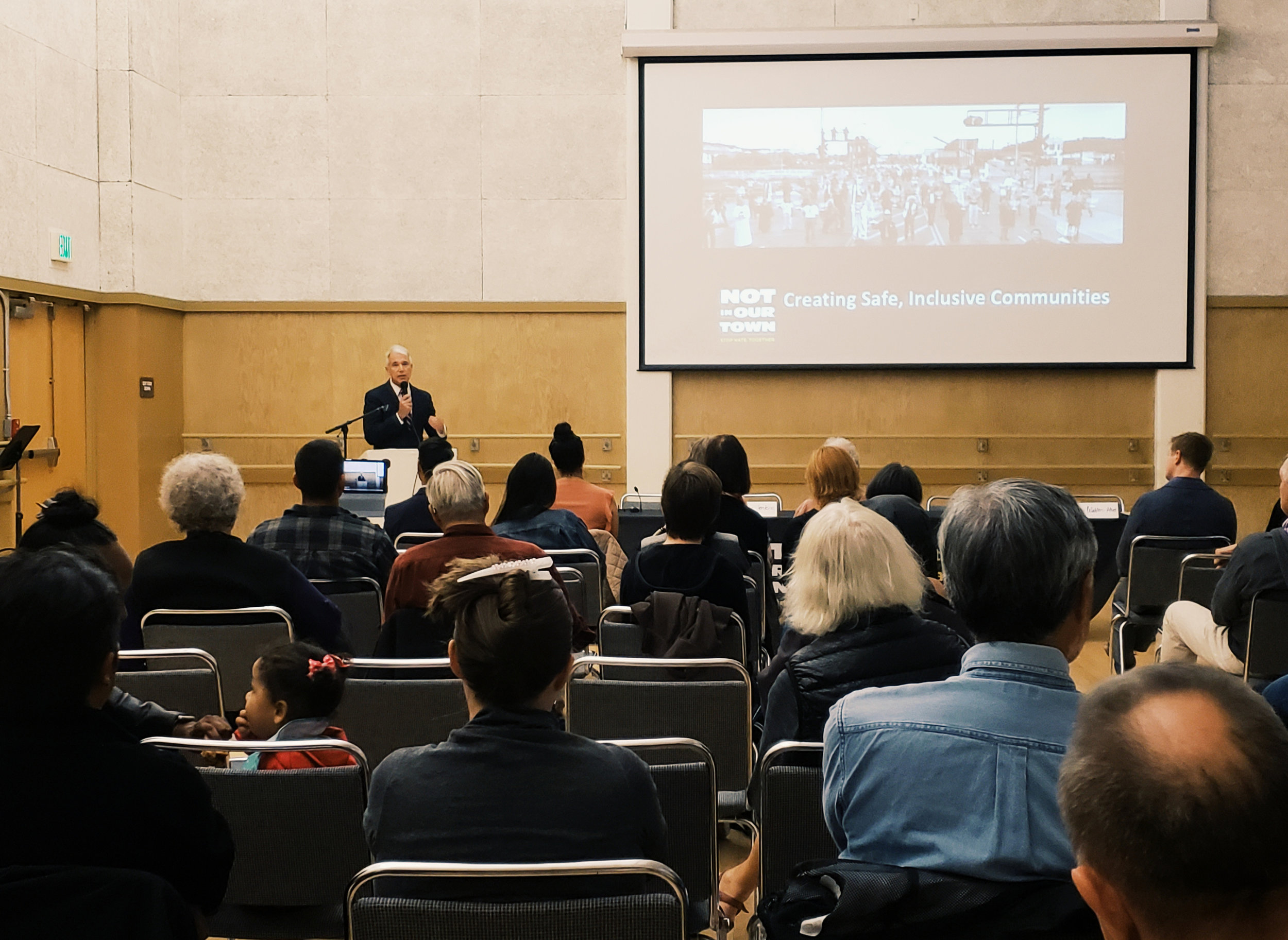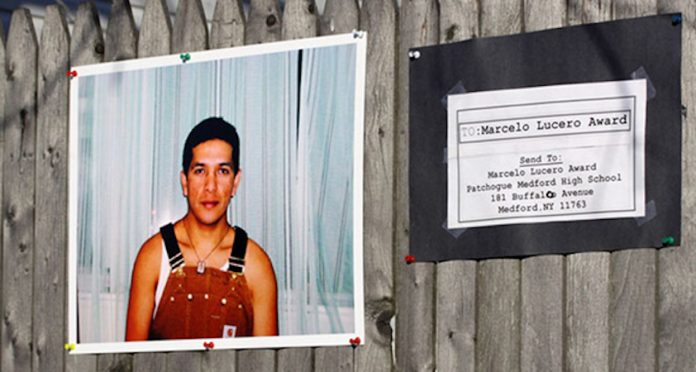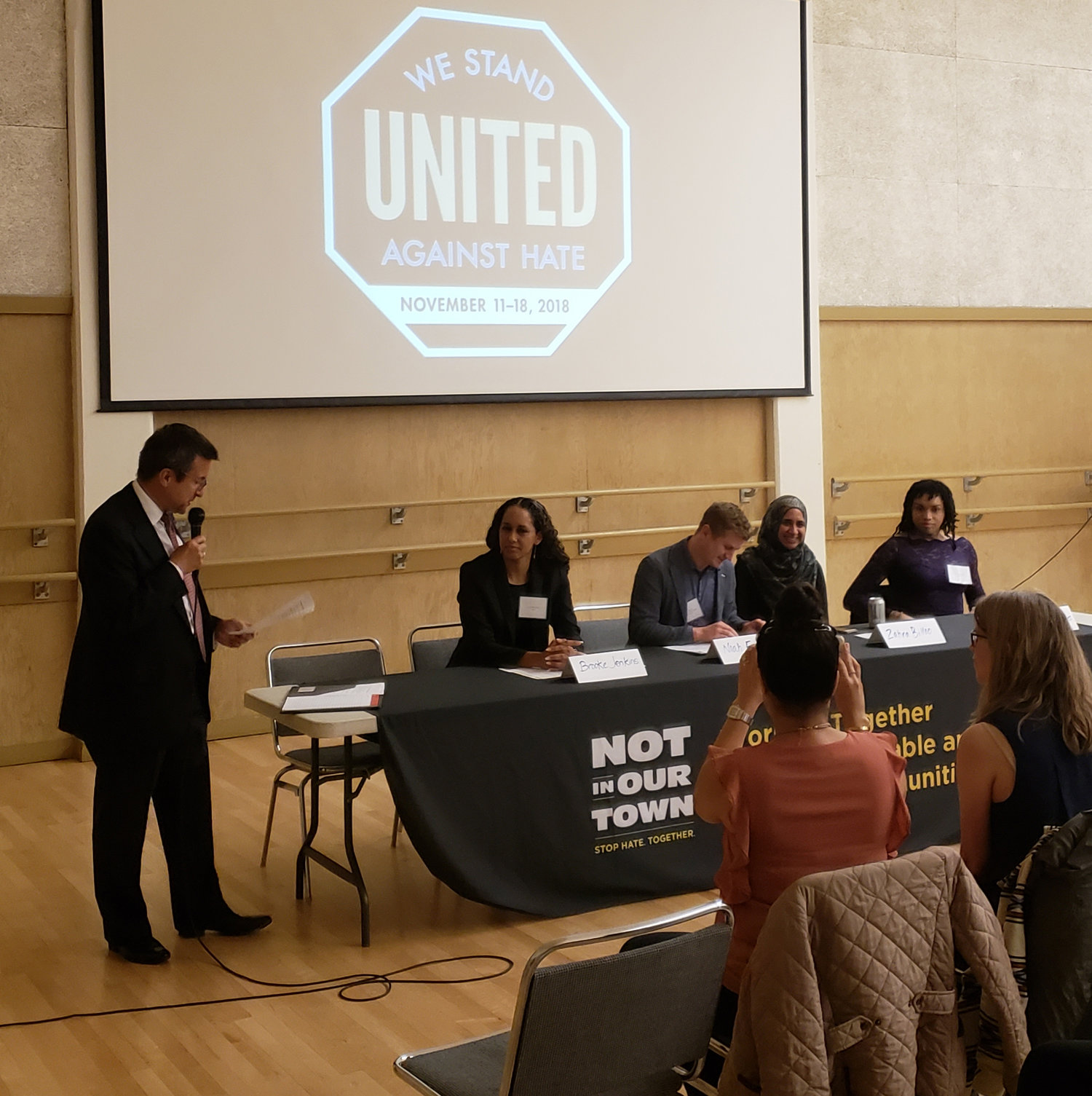 |
|
San Francisco District Attorney George Gascón introduces “Light in the Darkness” at the SF screening and community discussion earlier this month. |
With incidents of hate crime on the rise, communities all over America are searching for ways to address it. The Bay Area is not immune to hate crime, and that brought local officials and activists together in San Francisco for a community screening of a documentary about how another town fought back.
The October 9 screening and panel discussion at the Harvey Milk Center for the Arts in San Francisco was organized by Not In Our Town, and co-sponsored by Bay Area United Against Hate Week, the San Francisco District Attorney’s Office, The San Francisco Interfaith Council, and the San Francisco Human Rights Commission. As San Francisco District Attorney George Gascón reminded the audience, the problem is rampant in every community.
“We are licensing hate in this country,” said Gascón. “In my office, we know most of these crimes are terribly underreported.”
Communities can fight back, as the audience saw with the screening of “Light in the Darkness.” An hour-long documentary, tells the story of how the townspeople of Patchogue, NY, came together to take action after the murder of Marcelo Lucero, an Ecuadoran immigrant who had lived in the village for over a decade.
NIOT founder Patrice O’Neill introduced the film and the Not In Our Town movement to stop hate in local communities. She said the impetus for the film came from NIOT community leaders across the country who were reporting a rise in anti-immigrant violence and were seeking a story of response that could help spark discussion about how to address it.
 |
|
Long Island resident Marcelo Lucero was murdered in Patchogue, NY in 2008 in a hate crime. |
Long Island resident Marcelo Lucero was murdered in Patchogue, NY in 2008 in a hate crime. The story of how his neighbors responded to his death is documented in "Light in the Darkness,” a Not In Our Town documentary film.
The film begins when a series of attacks against Latino residents in 2008 culminated with the murder of Marcelo, an Ecuadorian immigrant who had lived in the Long Island village for 13 years. In 2010, four Patchogue teens were sentenced for his murder, which was determined to be a hate crime.
Over a two-year period, the story follows Mayor Paul Pontieri; the victim’s brother, Joselo Lucero; and Patchogue residents as they openly address the underlying causes of the violence, work to heal divisions within their community, and take steps to ensure everyone is safe and respected.
After the film a panel discussed the rise of hate in San Francisco, featuring four local leaders: SF Hate Crime District Attorney Brooke Jenkins, activist Nilani Waldon-Hoes, Zahra Billoo, executive director of the Council on American-Islamic Relations, San Francisco Bay Area (CAIR-SFBA) and Human Rights Commission Policy Analyst Noah Frigault.
“When I took over, the caseload I inherited was about five cases. I now have an average of 15 to 20 at all times,” said Jenkins. Despite that tangible increase, panelists talked about the difficulties of getting an accurate picture of how many people are actually attacked because underreporting remains a serious issue.
A 2017 Department of Justice report found that the majority of hate crimes go unreported, not just in the Bay Area, but across the country. The report defined hate crimes as "those that manifest evidence of prejudice based on rage, gender or gender identity, religion, disability, sexual orientation or ethnicity." Between 2011 and 2015, 54% of violent hate crimes went unreported. The DOJ report also found that rates were highest in urban areas and most commonly in the West.
After the film, two members of the audience, a Latina immigrant rights worker and a Muslim educator spoke about their own painful experiences with hate violence targeting their families and communities.
San Francisco Interfaith Leader Michael Pappas led the panel and audience discussion. “We are in a building named after a man that was killed because of who he was. The topics we will talk about tonight are germane,” said Pappas.
The panel surfaced the common apprehensions victims of hate crimes have in approaching law enforcement to report incidents. “As a black person, I have triggers and don’t want to interact with the police even if I have been assaulted or called something derogatory; I would rather just go home and deal with it myself,” said Nilani Walden-Hoes, a transgender woman who works in the tech sector.
 |
|
Moderator Michael Pappas with panelists Brooke Jenkins, Noah Frigault, Zahra Billoo and Nilani Waldon-Hoes. |
Moderator Michael Pappas with panelists Brooke Jenkins, Noah Frigault, Zahra Billoo and Nilani Waldon-Hoes.
“I think twice or even three times before I call the police and I’m a US citizen and a civil rights attorney,” added Zahra Billoo. “People are not reporting because they have internalized that this is normal or people are afraid of law enforcement.”
When people do not report hate crimes, law enforcement is unable to combat the violence, but the SF District Attorney’s office, working with the San Francisco Police Department Hate Crimes Unit remains committed, despite underreporting and other challenges presented by the law itself. Jenkins said getting a conviction on hate crime charges is difficult because, unlike other crimes, it asks the jury to evaluate hate as a motive.
“Fifty percent of the cases I’ve charged as a Hate Crimes DA have involved people who suffer from some form of mental illness or health issue,” Jenkins said. “Oftentimes jurors struggle with understanding what motivates someone when they suffer from a mental illness.”
“The Human Rights Commission is the agency...that reinforces discrimination laws. Unfortunately [due to] the limitations of the law and because these cases are so underreported, we as an agency haven’t been seeing as many of these cases even though we know they’re out there,” said Human Rights Commission representative Noah Frigault.
The panel also talked about the lack of resources and outreach provided by law enforcement and other local organizations who can act as intermediaries to guide people how to report hate crimes. “The trans community is very small in population and very diverse. Only now we are able to collaborate together and gain some power from the bottom up. The other part of the LGBTQ community had much better organizational skills in the past because they were a bit more visible and larger. So our only option was the police.” said Walden-Hoes.
“We need to do more outreach. I know that there are a number of community based organizations who are dealing with the fact that several of their members are undocumented and are afraid to come forward or have particular beliefs or views of the police department that are often times justified that make them feel uncomfortable [about] coming forward,” said Jenkins.
“People say they want to be allies, wear safety pins, want to ride the train with us, but what should we do when we actually see a hate crime?” asked Billoo. Panelists said it’s important to speak up when someone sees or experiences a hate crime by explaining the words spoken during the incident, not just the violence, and to provide support and spread awareness of available resources to help residents feel comfortable approaching law enforcement and report these sensitive cases.
Many thanks to Assistant District Attorney Marisa Rodriguez and Interfaith Leader Michael Pappas for helping to lead and convene this event in partnership with Not In Our Town.
“Real change takes place at the local level. Find solutions to inspire and empower residents and community leaders.”
DOWNLOAD STOP HATE ACTION KITS →
The event closed with a call for community members to become involved with the Bay Area Stands United Against Hate Week movement; a call for seven days of local civic action by people in every Bay Area community to stop the hate and implicit biases that are a dangerous threat to the safety and civility of our neighborhoods, towns and cities.
* * * * *
Not In Our Town is making ”Light in the Darkness” available for free screenings during November as part of Bay Area Stands United Against Hate. If you are interested in hosting a screening in your community, please contact us and we can help you organize a screening!
Add new comment